
40 Years Alive
Intellectual
retrospectives abound - treating punk as an historical,
museum exhibit. It isn't. One band with pre-punk routes back to
McLaren, has never given up. With 3 original members and sounding
exactly the same live as they did in 1977, the punk gang known as 999
are still living by their opening mantra, 'I'm Alive'.
Front man NICK
CASH guides PHIL SINGLETON from the early 70s through to the present
day.
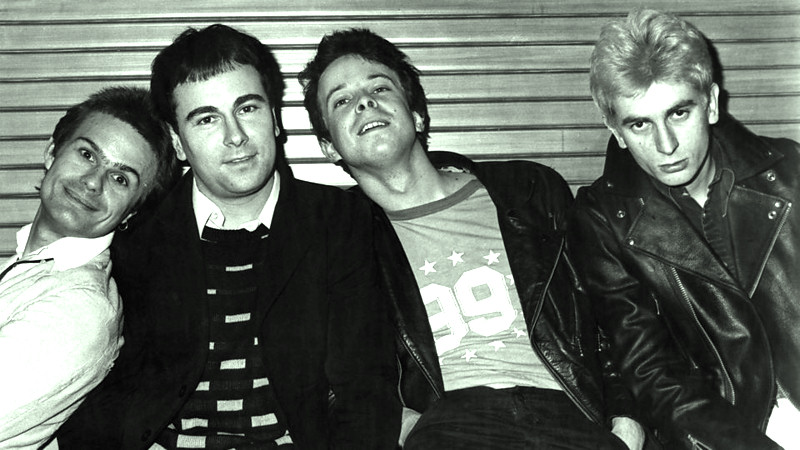
|
Nick:
"Ian Dury was my tutor when I was at art school in Canterbury. He'd
been
tutored at the Royal College of Art by Peter Blake, the guy who did the
Sgt. Pepper cover, and he was heavily into pop art. Ian used to teach
me when I was doing my degree. We liked Gene Vincent and Eddie Cochran
and he loved some country & western and jazz, Roland Kirk and
so
on. We'd get together and play when he used to stay at my student
house. Ian and myself formed Kilburn & The High Roads for the
college 'end of term' dance. It went down a complete storm because
there wasn't anything like it. Pub Rock was just starting in London
with bands like Bees Make Honey and Brinsley Schwarz. We started to go
up to The Tally Ho and The Kensington and play in those pubs. It took
off from there and we ended up touring with The Who on their
Quadrophenia Tour.
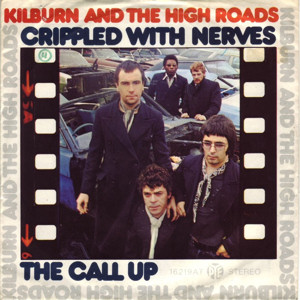 In the meantime we got a record
deal with Pye
Records and made an album called Handsome. At the last gig Johnny
Rotten was there. People would come and see us ‘cos they liked the band
and the style because it was a bit avant-garde and people wore
different clothes. The music was quite rough and you never knew what
was going to happen. Like Punk Rock. In the meantime we got a record
deal with Pye
Records and made an album called Handsome. At the last gig Johnny
Rotten was there. People would come and see us ‘cos they liked the band
and the style because it was a bit avant-garde and people wore
different clothes. The music was quite rough and you never knew what
was going to happen. Like Punk Rock.
(Right: centre stage on 7” German picture sleeve)
Malcolm McLaren used to make the clothes for me when I was in Kilburn
& The High-Roads. The Kilburns were the first group outside the
New
York Dolls to wear Malcolm McLaren's stuff. I remember going down to
his shop ‘Sex’. He had this fetish mask with zips for the eyes. Malcolm
said it would be great if I wore it on stage. I said "Malcolm, I'll
have to pass on that, it will be too hot!" In a way I wished I had worn
it! It was amazing to be a part of that scene. He was a very good
tailor. Ian Dury & I loved the zoot suits the Jamaicans were
wearing - wide cut trousers and jackets. Malcolm said he had this block
pattern he called his Alan Ladd, after the American actor, which was a
very similar design, and lo and behold he made a fantastic suit which
I've still got to this day.
He'd then make gear for all the bands, Ian Dury's satin dressing gown
which said "Billy Bentley" on the back which he'd wear on stage. The
image of Kilburn & The High Roads was a strong image. The Who
loved
it. Keith Moon liked our drummer David Rohoman who was paralysed from
the waste down. Keith used to call out from behind the drum kit and
watch him play. David would rock back and forwards, & he was
very
dextrous with his hands.
The Who asked us to go on the American leg of
the Quadrophenia tour in '74, but we couldn't do it because of Visa
problems, so Lynyrd Skynyrd got it. They took off on the fly but it
killed quite a few of them later so I was glad it wasn't us!
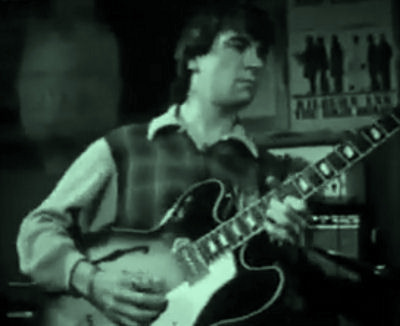 I fell out
with Ian and left the
band. By that time I was writing with
Guy (Days); we'd written 'I'm Alive' and 'Emergency'. Guy is my
brother. We never talked about this; we weren't bothered about it. Guy
used to come to the recording sessions of Kilburn & The High
Roads
and helped me do a couple of guitar solos. He was a good player and I
thought, "blimey he's playing the lead really good now!" I fell out
with Ian and left the
band. By that time I was writing with
Guy (Days); we'd written 'I'm Alive' and 'Emergency'. Guy is my
brother. We never talked about this; we weren't bothered about it. Guy
used to come to the recording sessions of Kilburn & The High
Roads
and helped me do a couple of guitar solos. He was a good player and I
thought, "blimey he's playing the lead really good now!"
(Left: Keith Lucas in the Kilburns)
The Kilburns came to a messy end with people jumping up and down
wanting money. Wilko Johnson had left Dr Feelgood and their manager
Chris Fenwick asked me about taking the guitar playing part, but I
didn't want to do it. Pub Rock had had its day and there was this new
thing coming along. Guy and me thought it would be much more fun to do
that. We sent tapes to record companies but no one was interested. Then
the next minute punk rock happened and all the people that didn't want
to know before wanted to sign up the very same songs. Goes to show you
record companies have cloth ears!
I also changed my name. I was known as Keith Lucas in Kilburn &
The
High Roads. When punk started I didn't want anybody to come down and
see us off the back of the Kilburns. I wanted a completely new start,
so I picked the name Nick Cash. Here was something new and it worked.
We instantly built up our own following. We were able to go on without
holding onto the coat tails of pub rock.
We put
an advert in
the Melody Maker: "Wanted. Bass player and drummer for punk rock band."
We auditioned people at Manos Studios at the bottom of King's Road. We
had so many people turn up: Tony James, Chrissie Hynde, Dolphin Taylor,
Jon Moss. In the end we picked Jon Watson and Pablo Labritain because
they were the best people for the job.
Pablo was the last person to audition. His mate dragged him down. He
was wearing a pin stripe suit, black shoes with diamond studs on them.
He looked amazing, he looked the part. December 5th '76 was
when
I called Pablo and said he was in the band. It wasn't till later on
Pablo revealed he was the first drummer in The Clash. Pablo didn't
really get on with Bernie Rhodes. He was at school with Joe Strummer
and was a mate of his. 999 were involved with Bernie at one point but
decided not to pursue it any further. There were a lot of people around
at the time."
Making
their
live debut as The Dials at Northampton Cricket Club on 22nd Janaury
'77, they played one show at the Nashville Rooms as Gene Carson’s
Fanatics, followed by gigs as 48 Hours. By May '77 they had settled on
999. Cue the iconic logo.
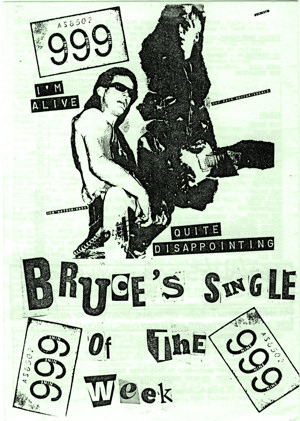 Nick: "It's a
fabulous thing that has endured. George Snow designed it; he makes art
and films to this day. I went to his flat in Earls Court. We didn't
want a name starting with 'The' and thought it would be better to have
figures rather than letters. That's how the band name 999 came about.
He pulled a ticket out of one of those small raffle ticket books made
of cheap paper with serial numbers on the tickets. The ticket had
number AS8502 which we left on. George's idea was to put the 'Nine'
'Nine' 'Nine' in the spines of the numbers to avoid confusion, ‘cos in
some countries they are gonna go "nine, ninety-nine". He also had the
idea to leave the thumb print on, so it looks a bit rough. It's a work
of art. Nick: "It's a
fabulous thing that has endured. George Snow designed it; he makes art
and films to this day. I went to his flat in Earls Court. We didn't
want a name starting with 'The' and thought it would be better to have
figures rather than letters. That's how the band name 999 came about.
He pulled a ticket out of one of those small raffle ticket books made
of cheap paper with serial numbers on the tickets. The ticket had
number AS8502 which we left on. George's idea was to put the 'Nine'
'Nine' 'Nine' in the spines of the numbers to avoid confusion, ‘cos in
some countries they are gonna go "nine, ninety-nine". He also had the
idea to leave the thumb print on, so it looks a bit rough. It's a work
of art.
He designed the first three covers for us; 'I'm Alive', 'Nasty Nasty'
and 'Emergency'. He'd get photographs, screw them up then flatten them
out. He used a nail gun to write the names out. On 'Nasty Nasty' he
went even further; he ripped the eyes out of the photographs of band
members, turned them upside down. With the first album cover
and
videos we thought up a lot of it ourselves. We worked on it quite hard
& it paid off for us.
Our debut single 'I'm Alive' sold out of its first pressing of 10,000
copies on our own label Labritain which was named after Pablo! 'I'm
Alive' was all about watching TV and buying stupid products; it was a
great song to write with Guy, a great 1st song to do.
(Right: I'm Alive - Single Of The Week)
We had help setting up the label from our managers Dai Davies and Derek
Savage. They were doing The Stranglers, bands like that. They had the
licences for The Red Cow, The Nashville Rooms, and The Hope &
Anchor, so they had the gigs. We had residencies at The Hope &
Anchor and the Marquee where we sold out every night and then we went
on to do the Lyceum.
We did matinee performances for fans too young to get in with the
drinking laws. We did it at Middlesbrough Rock Garden, Eric's
Liverpool, loads of places. In the Liverpool Museum there is a tribute
to that, our badge is in a display cabinet about the matinee shows.
I'm glad we had a bit of artistic freedom when we started. The record
companies didn't know what punk was. They tried to manufacture punk
bands with varying degrees of success, but punk was the real thing and
came from a real area of people; that's why it worked. 999 were one of
the first bands to do coloured vinyl; we had a 12"single we gave away
with 'Separates' and even recorded a 7" version of 'Nasty Nasty' at
78rpm. We released 100 of them. That's become very valuable, not just
with 999 fans but record collectors. There are only 100 different 45rpm
records in the world recorded at 78rpm.
Vinyl was my favourite phase in music. I remember buying Buzzcocks'
'Spiral Scratch', it had a great black and white cover with a picture
of the band. We played the Electric Circus in Manchester with
the
Buzzcocks and The Adverts. It was a great gig, a brilliant venue."
In
July '77,
Sounds remarked that 999 were "One of the best pop groups to emerge in
years” and they “Might, conceivably, be bigger still than the Sex
Pistols." The success of the single and a growing reputation on the
live circuit saw 999 snapped up by United Artists, with 'Nasty Nasty'
following in October - an undisputed punk classic.
|
1978
was the year the band were most visible in the UK, releasing 2
faultless albums, '999' (March) and 'Separates' (September), and 4
timeless punk singles - ‘Emergency’, ‘Me & My Desire’, ‘Feelin’
Alright With The Crew’, and ‘Homicide’.
At
the BBC, 999 recorded a John Peel session in October and appeared on
the Old Grey Whistle Test in December with 'Homicide' and 'Let's Face
It'.
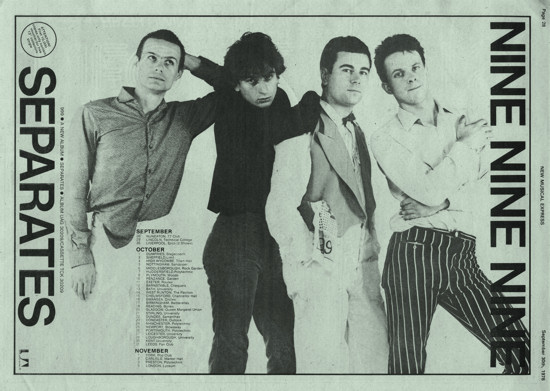 Nick:
"Andy Arthurs had produced 'I’m Alive' so we recorded the 1st album,
'999', with him at TW Studios, Fulham. Martin Rushent was coming on the
scene working with bands at Albion Music and having a large amount of
success. Our album wasn't developing in the way we'd hoped so we teamed
up with Martin. We'd recorded most of it with Andy, but we finished it
off. I went down to Olympic Studios in Barnes and remixed it
with
Martin and did a bit more work on it. It got a more lively, louder mix;
he saved it in a way. Nick:
"Andy Arthurs had produced 'I’m Alive' so we recorded the 1st album,
'999', with him at TW Studios, Fulham. Martin Rushent was coming on the
scene working with bands at Albion Music and having a large amount of
success. Our album wasn't developing in the way we'd hoped so we teamed
up with Martin. We'd recorded most of it with Andy, but we finished it
off. I went down to Olympic Studios in Barnes and remixed it
with
Martin and did a bit more work on it. It got a more lively, louder mix;
he saved it in a way.
We'd formed a relationship with him so he went on
to record 'Separates', which we also did at TW Studios. It was a small
studio, but it had a good engineer called Alan Winstanley.
There was a
launderette above it and I remember soap suds coming down the walls and
starting to foam up in the corner! It was a rough place but had a good
atmosphere. We were pleased with the results of those two albums.
I'd
been
writing 'Homicide' but it was waffley with loads of chords in it - it
wasn't working. We needed another track to finish off 'Separates' so I
re-wrote 'Homicide' in its present form the night before. We went down
to the studio, I ran through it with the band once, they switched the
record tape on and we did it there and then. One take and that was it.
Martin said "I don't think you'll do better than that". It's got a good
menacing feel to it.
Management
were in such a hurry to get 'Separates' out they had to design a cover
with no song titles on it. At the time you just had to get the records
out. We were on tour and always getting pressured to do them, sometimes
between heavy bouts of touring."
The
debut album reached #53 in the Charts while the single 'Homicide' -
999's signature song - reached #40 in the UK Chart in the face of BBC
paranoia.
Nick: "They
were putting everything under a microscope. On the John Peel Session
they said will you sing "I believe it's Homicide" rather than "I
believe in Homicide". Of course we didn't do it. So the BBC said they
wouldn't play us and banned the single. They said "you can't write a
record about murdering people." But they were showing Kojak - death in
the Bronx - every week!"
999 departed United Artists
in the
summer of '79.
Nick:
"The albums had sold what they were going to sell. UA weren't
interested in pushing it so we renegotiated to get out of the contract.
We got offered recording contracts in America 'cos of our success
there, like Polydor and Polygram. Andrew Lauder at UA was good, he
understood it. We worked closely with him on artwork and in bringing in
the people we wanted. Andrew went on to form Radar Records and we did a
single for him, 'Found Out Too Late' (#69 hit, October '79). We were
going to do an album for him, but it didn't work out."
After
the brief stop-off at Radar, 999 signed with Polydor in late 1979. 'The
Biggest Prize In Sport' followed in January 1980 hitting #177 on the US
Billboard Album Chart. It was the 2nd American album for 999, 'High
Energy Plan' (a reworking of 'Separates') had been put out the previous
year by PVC/Radar.
The
close bond between band and fans has been central to 999's longevity,
coming to the rescue on occasion; take Ed Case (aka Paul Edwards), who
stepped in and drummed on the single 'Found Out Too Late', the album
'The Biggest Prize In Sport', and filled in live both in Europe and the
US.
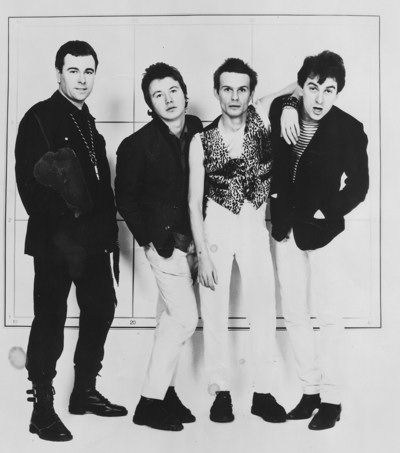 Nick:
"Pablo broke his arm in ’78, two days before we were doing a show at
the SO36 Club in Berlin. Ed was part of our following, the Southall
Crew. We went to the rehearsal and he knew all the songs note perfect.
He was very young, about 17. He was fantastic and got a standing
ovation. He was a brilliant drummer. From that, Ed then went on to play
with Hazel O'Connor, and then worked at the Victoria Theatre playing
the drummer in Buddy The Musical. Ed didn't know what to do and he
ended up doing very well just because he helped us out. It was great
what 999 were able to do for him. Gave him an opportunity. " Nick:
"Pablo broke his arm in ’78, two days before we were doing a show at
the SO36 Club in Berlin. Ed was part of our following, the Southall
Crew. We went to the rehearsal and he knew all the songs note perfect.
He was very young, about 17. He was fantastic and got a standing
ovation. He was a brilliant drummer. From that, Ed then went on to play
with Hazel O'Connor, and then worked at the Victoria Theatre playing
the drummer in Buddy The Musical. Ed didn't know what to do and he
ended up doing very well just because he helped us out. It was great
what 999 were able to do for him. Gave him an opportunity. "
(Right: Nick, Ed Case, Jon Watson, Guy Days)
When the chance to take on
America
came, the band took it. It would prove exciting, eventful and rewarding
in equal measure.
Nick:
"At the time people would say we'd sold out going to America. You can't
be insular, we jumped at the opportunity to go to Japan, Brazil,
Argentina... it's been incredible. When we started off in the US, there
were bands out there like The Police, Ultravox, and XTC. We
went
out in vans and toured all over; we'd do 56 shows on the trot. We built
up a following and ended up selling out big venues like Santa Monica
Civic Centre. A lot of bands out there liked us; we played with The
CIrcle Jerks, The Dickies, Black Flag, and Social Distortion and got
adopted by the Skateboard crowd; it was a really good time for us.
The
great
thing that did happen was Slam Dancing! We got slagged off by the Los
Angeles Times. It was the mosh pit really, with a bit of stage diving
and running about! The LA Times came down and said you don't want to
let your children go to this terrible thing, “that kid's got a bloody
face, another's injured”. Unfortunately, two weeks later, some people
who were at our concert attacked a chauffeur on Sunset Strip. We were
accused of inciting riots, but you can't be responsible for somebody
else's actions. Then The Sun ran it in England. They wanted it all
kicking off like with Johnny Rotten, the "Filth and the Fury", with
everyone hating punks."
The
hysterical Sun screamed in July 1980, "Punk rockers have launched a
new, frightening craze... Slam Dancing has become all the rage in
California since it was introduced by a raucous British group called
999."
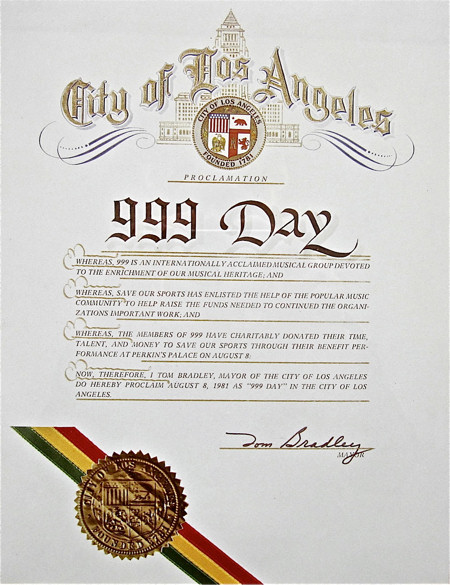 Nick:
"After the LA Times trouble, we went to Soho Square in London with The
Sun. We had no problem giving an interview to set the matter straight.
The photographer said, "Can you run into somebody and start slam
dancing? Be controversial so we can take pictures." We said no, we'll
talk about the music. We don't turn it on like that. Yes, we do play
very fast on stage; people jump on stage and enjoy
themselves.
We're about sport, people having a good time and letting off a bit of
steam. Most of our fans are nice people! We were on page 1 and 3 of The
Sun. It didn't do our career any harm at all actually! We just got on
with it. When we wouldn't perform like monkeys for them, they lost
interest. If we'd gone out and lay on a street in front of a taxi with
blood all over us, they would had said "look at this!" That wasn't the
example we wanted to set. Nick:
"After the LA Times trouble, we went to Soho Square in London with The
Sun. We had no problem giving an interview to set the matter straight.
The photographer said, "Can you run into somebody and start slam
dancing? Be controversial so we can take pictures." We said no, we'll
talk about the music. We don't turn it on like that. Yes, we do play
very fast on stage; people jump on stage and enjoy
themselves.
We're about sport, people having a good time and letting off a bit of
steam. Most of our fans are nice people! We were on page 1 and 3 of The
Sun. It didn't do our career any harm at all actually! We just got on
with it. When we wouldn't perform like monkeys for them, they lost
interest. If we'd gone out and lay on a street in front of a taxi with
blood all over us, they would had said "look at this!" That wasn't the
example we wanted to set.
At the Whisky a Go Go we’d do three nights in a row, twice a day. I
remember seeing a huge 999 billboard in LA next to Cher! We had our
live album out, 'The Biggest Tour In Sport' (November 1980 - Polydor
USA) which sold a lot of copies in the US.
We did a charity concert at Perkin's Palace in Los Angeles to raise
money to keep the schools sports facilities open during summer holidays
and keep kids off the streets. It was a way to pay them back for the
support they'd given us. The first black mayor of LA, Tom Bradley,
heard about this and came to the concert. He told us "you're only a
small thing, not one of the movie stars like Cary Grant, but you've
still come out and done this and raised this money. I'm going to give
you a 999 Day and make you members of the City of Los Angeles.”
I have
on my wall a certificate headed “999 Day” that says: "999 have
charitably donated their time, talent and money to Save Our Sports. I,
Tom Bradley, Mayor of Los Angeles do hereby proclaim August 8 1981 as
"999 Day" in the city of Los Angeles." That means more to me than a
gold record.
We played with The Professionals in America, they supported us for a
couple of gigs then someone committed suicide by driving into their
car, so they had to pull out of the tour. I remember around that time
Guy and I bumped into Steve Jones in New York. He had this guitar, it
was a brilliant SG, and he offered it to Guy for $100. Guy gave him the
money there and then. Later we saw The Great Rock 'N' Roll Swindle and
he
was playing the same guitar on a boat in Brazil & he threw it
in
the water! It played perfectly! Unfortunately it was nicked at
Rebellion. It's only equipment. It's more important the band is
alright and keeps going."
999’s
hard
work Stateside was rewarded when 'Concrete' (April 1981), gave the band
a further Billboard Album Chart success, hitting #192. It was an album
that would spawn 2 U.K. chart singles, the spaghetti western soaked
'Obsessed' (#71) and a cover of Sam The Sham & The Pharaohs's
1966
hit 'Lil Red Riding
Hood' (#59). Now on Albion Records - their manager's company - 999
appeared reinvigorated.
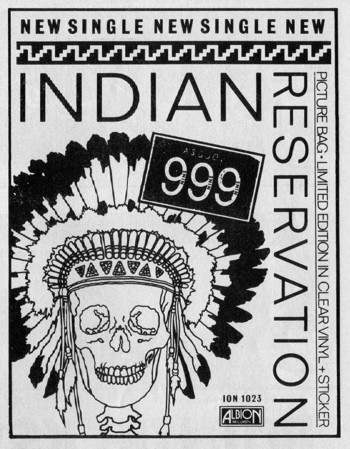 Nick:
"Joey Ramone
liked 'Obsessed'. It was originally called 'Sex'. We used the old Sgt.
Pepper 4 track machine; Vic Maille, the producer had it and said we
could use the echo on it. Guy really got his head around it and it
worked. 'Lil Red Riding Hood' was my favourite song at school. My first
ever band when I was 15 years old was called The Pentagon and I did it
with them." Nick:
"Joey Ramone
liked 'Obsessed'. It was originally called 'Sex'. We used the old Sgt.
Pepper 4 track machine; Vic Maille, the producer had it and said we
could use the echo on it. Guy really got his head around it and it
worked. 'Lil Red Riding Hood' was my favourite song at school. My first
ever band when I was 15 years old was called The Pentagon and I did it
with them."
'Concrete'
got
the thumbs up in Sounds: “This is an album choc full of skilfully hewn
rock. And what’s more important, it’s a lot of fun. ” Sounds also
reported on 999’s Lyceum show in London in May. “Live, they reign
supreme. Caught up in the excitement of the show it’s difficult to
remember that despite fine albums, they haven’t yet cracked it here.”
Nick Cash added, “This is just about the biggest crowd we’ve played to
here... things just seem to be getting bigger for 999 all the time.”
A
final U.K.
hit came in November as 'Indian Reservation' reached #51, with the
magnificent June 1982 single 'Wild Sun' - another western flavoured
affair - failing to get the acclaim it deserved. No matter, it was
loved by Joe Strummer.
The
biggest
obstacle to progress now came courtesy of the winds of change blowing
through the U.K. as punk fell out of favour with a snobbish music press
desperate to find the next new thing.
Nick:
"The New
Romantics came on the scene in the 80s and punk became passé. We were
getting a bit worried so we tried another album for Albion, '13th Floor
Madness' (1983), to change our direction, which wasn't really a good
idea. It was getting very difficult, we couldn't get gigs, audiences
were dwindling, but we still kept going. We'd signed up for these
record deals with United Artists and Albion to make too many records.
Punk was waning and we were tied into contracts we had to wait to
dissipate. Then we did 'Face To Face' (1985) on our own Labritain
label. Jon Watson left in '86 to form his own band called Rubber
Trixie."
Danny
Palmer -
a lifelong friend of Pablo’s - filled Jon's shoes as the band ignored
their brief deviation on record to continue with electrifying punk
shows, captured on the live LP 'Lust Power and Money' (1987 -
ABC
Records). After a short hiatus, 999 regrouped for a spectacular return
to form on the 1993 album 'You Us It' (Anagram Records), with Arturo
Bassick picking up the bass and remaining an integral part of 999 until
this day. What's more, punk was undergoing a resurgence and the fans
were back.
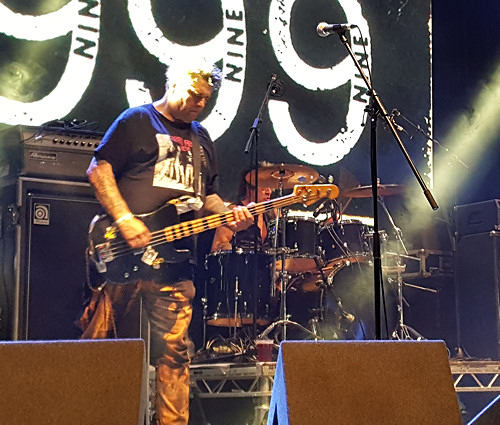 Nick:
"Arturo had
come back on the scene. He was in The Lurkers and we had the same
management, Dai Davies & Derek Savage, who had also managed
Arturo's band Pinpoint. Pinpoint had a good single called Richmond.
They were on Albion Records and had also been produced by Martin
Rushent. We’d played with them at a few places. Arturo is very
energetic; he's well known in England and Europe and he enjoys playing
with 999. It was a good thing for him. Nick:
"Arturo had
come back on the scene. He was in The Lurkers and we had the same
management, Dai Davies & Derek Savage, who had also managed
Arturo's band Pinpoint. Pinpoint had a good single called Richmond.
They were on Albion Records and had also been produced by Martin
Rushent. We’d played with them at a few places. Arturo is very
energetic; he's well known in England and Europe and he enjoys playing
with 999. It was a good thing for him.
(Left: Arturo on 999 duty with
Stuart
Meadows on drums at Rebellion 2016)
People who were a bit younger than the original crowd came along and
other bands started coming back into it so it took off again. It has a
worldwide following. We can go to Brazil and Argentina and play to a
similar kind of audience that we play to in London. It's extraordinary.
It's the culture of the thing and the common bond of the music.
We wanted 'You Us It' to be lively with good strong songs - not too
long - that people would like. We recorded it at Alaska
Studios.
'Black Flowers For The Bride' is great for us, we usually open the set
with it and it's become a big favourite. Other bands have
recorded it. It was nice to come up with new songs that have lasted,
not just 'Homicide' and so on! I don't think the guy who put out the
next album 'Takeover' (1998 - Get
Back Records) realised what he had, which was a shame. But John Esplen
at Overground has done quite well with his releases."
Check
out the
excellent Overground Records demo collections 'Slam!' and 'Outburst',
and the final 999 album to-date, 'Death In Soho' (2007), another
explosive punk document littered with gems such as 'Gimme The World',
'Last Breath' and 'Stealing Beauty'.
40
years of
graft hasn’t dampened 999’s love of the music and the connection with
their fiercely loyal following who, in return, have rewarded the band
with unique moments.
Nick:
"Just recently in Prague, this guy told me he was put in prison for
listening to 'Nasty Nasty'. When the communist regime existed, punk
rock was considered too controversial and politically dangerous.
Someone reported him to the Police. They confiscated the record and put
him in prison. He told me, "It's because we wanted these things from
the West it was possible for the wall to come down. I wouldn't be a
free man now.”
We
used to go
to Berlin before the iron curtain was down . We used to get searched
& it was difficult, it was a long journey but I loved the value
of
it. So, all these years later when someone tells you you've helped them
become a free person, that's fantastic.
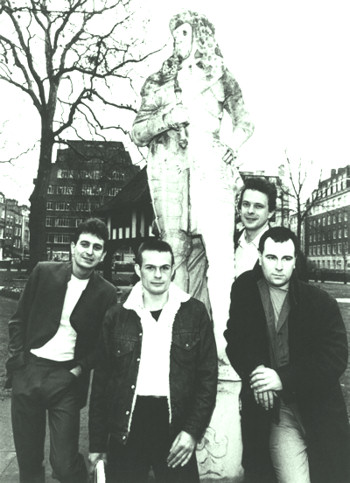 In America
now it's very hard for young bands to go there. In the UK &
Europe,
American bands can come & go quite freely, but going to the US
costs so much money to hire lawyers for your work permit. We were
lucky, we managed to get round it. It was a big cultural exchange for
999 and for people who came to see us. Green Day wouldn't have existed
without punk rock & look what they do for the US economy and
the
young people. If you earn under a certain amount of money they should
let you in as an artist, otherwise you shut your boarders and don't
interact with the rest of the world. In America
now it's very hard for young bands to go there. In the UK &
Europe,
American bands can come & go quite freely, but going to the US
costs so much money to hire lawyers for your work permit. We were
lucky, we managed to get round it. It was a big cultural exchange for
999 and for people who came to see us. Green Day wouldn't have existed
without punk rock & look what they do for the US economy and
the
young people. If you earn under a certain amount of money they should
let you in as an artist, otherwise you shut your boarders and don't
interact with the rest of the world.
(Right:
Late
70s: Guy Days, Jon Watson, Pablo Labritain, Nick Cash)
At
a gig in
Dusseldorf in the late 70s, there were some young kids outside aged
12-13 who loved the music. I knew they wouldn't be allowed in so I got
my guitar, put this little amplifier across my shoulder, went outside
and played a concert for them on the street. They loved it, went mad
and I did an encore. Shoot forward many years to 1991 and Die Toten
Hosen's album 'Learning English'. Singer Campino was one of those kids!
It changed his life. Die Toten Hosen became the number one band in
Germany. He wanted to record 'Nasty Nasty' as a tribute and put it on
the album. 'Learning English' went gold, it was a brilliant album. It
brought punk classics to a new audience in Germany and as a result we
are touring there to this day. It was a great idea and that's how I got
to sing with Johnny Thunders.
We
did The
Heartbreakers' 'Born
To Lose' in London with Die Toten Hosen and Johnny – the last ever
record Thunders made. It was a real honour. But the money they gave
Johnny for doing the record, he used in America to buy drugs. I think
the dealers knew he had money from that record on him. He may have been
murdered to get the money ‘cos it wasn't found on him.
Over
the
years we played with The Heartbreakers quite a lot. When they first
came over to London we played one of the first ever gigs they did at
Kingston Polytechnic, and later we played the Music Machine with them
and some others. We also played with them in New York at the Peppermint
Lounge. One night Johnny Thunders was doing his acoustic set with
Walter Lure
and he'd taken too much drugs. His microphone stand was slipping down,
he couldn't get it to stay up, and it was a bit of a shambles. The
audience in New York knew what was going on & were shouting
"get it
together you junkie" which wasn't too helpful but did have a ring of
truth about it because you can't be too out of it when you play, let's
face it. It's very sad but these things happen."
It
may be 40
years on, but 999 are still out there doing it, still delivering and
still enjoying the here and now. Pablo occasionally takes a break, with
his drum duties ably filled by Stuart Meadows.
Nick: "We
do
great
things like the Rebellion Festival. Promoters come from all over the
world and see the band there. We are the only band to have done every
single Rebellion. I prefer our early evening slot to later on. They
like us to kick it off with a bang, get everybody in there.
I think it then emptied a bit when Bob Geldof was there (2015)! It's
not the only time he has upset the audience, I remember playing with
The Boomtown Rats in the 70s at the Music Machine in London. He did the
same thing and someone didn't like it and got on stage and punched him
in the mouth! We were in Vienna once, a place we were really popular,
and The Boomtown Rats were doing a show nearby. Bob could see all the
people coming to our show. He said "Nick, why are 999 so big in
Vienna?" I replied "Bob, why are The Boomtown Rats so big in England?!"
He didn't like it. I was called a couple of names!
We've recently worked with Cleopatra Records in the US to release some
999 US radio recordings (4 CD Box set, 'Bay Area Homicide'). College
radio played the music, that's how punk and new wave broke over there.
We'd play gigs at the universities and they would play our music.
999 have only ever cancelled two gigs because of illness. In 40 years!
We're lucky to go on, we've still got a following and we are still
alive. Why should we stop?"

(An
abridged
version of this feature appeared in Vive Le Rock #32 - now sold out)
|
Written by Phil
Singleton 999
Punk band Full story as told by
Nick Cash
|
|

|
 999 Official Facebook 999 Official Facebook |
|







 In the meantime we got a record
deal with Pye
Records and made an album called Handsome. At the last gig Johnny
Rotten was there. People would come and see us ‘cos they liked the band
and the style because it was a bit avant-garde and people wore
different clothes. The music was quite rough and you never knew what
was going to happen. Like Punk Rock.
In the meantime we got a record
deal with Pye
Records and made an album called Handsome. At the last gig Johnny
Rotten was there. People would come and see us ‘cos they liked the band
and the style because it was a bit avant-garde and people wore
different clothes. The music was quite rough and you never knew what
was going to happen. Like Punk Rock.  I fell out
with Ian and left the
band. By that time I was writing with
Guy (Days); we'd written 'I'm Alive' and 'Emergency'. Guy is my
brother. We never talked about this; we weren't bothered about it. Guy
used to come to the recording sessions of Kilburn & The High
Roads
and helped me do a couple of guitar solos. He was a good player and I
thought, "blimey he's playing the lead really good now!"
I fell out
with Ian and left the
band. By that time I was writing with
Guy (Days); we'd written 'I'm Alive' and 'Emergency'. Guy is my
brother. We never talked about this; we weren't bothered about it. Guy
used to come to the recording sessions of Kilburn & The High
Roads
and helped me do a couple of guitar solos. He was a good player and I
thought, "blimey he's playing the lead really good now!"  Nick:
Nick: Nick:
Nick: Nick:
Nick: Nick:
Nick:

 In America
now it's very hard for young bands to go there. In the UK &
Europe,
American bands can come & go quite freely, but going to the US
costs so much money to hire lawyers for your work permit. We were
lucky, we managed to get round it. It was a big cultural exchange for
999 and for people who came to see us. Green Day wouldn't have existed
without punk rock & look what they do for the US economy and
the
young people. If you earn under a certain amount of money they should
let you in as an artist, otherwise you shut your boarders and don't
interact with the rest of the world.
In America
now it's very hard for young bands to go there. In the UK &
Europe,
American bands can come & go quite freely, but going to the US
costs so much money to hire lawyers for your work permit. We were
lucky, we managed to get round it. It was a big cultural exchange for
999 and for people who came to see us. Green Day wouldn't have existed
without punk rock & look what they do for the US economy and
the
young people. If you earn under a certain amount of money they should
let you in as an artist, otherwise you shut your boarders and don't
interact with the rest of the world.

